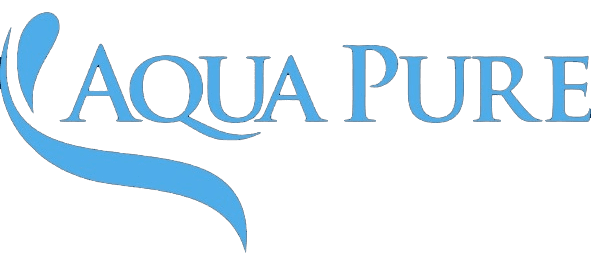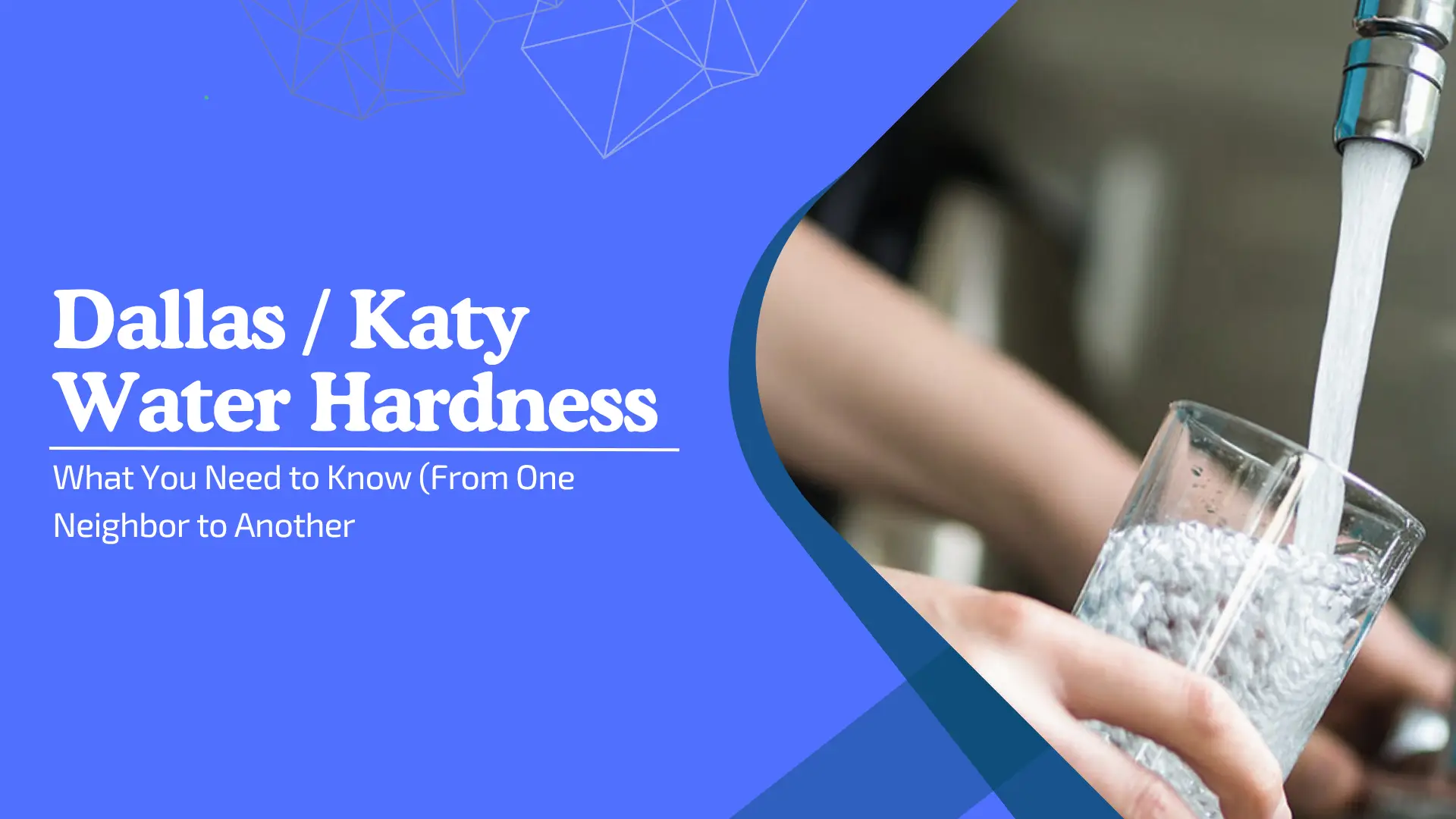If you live in the Dallas–Fort Worth / Katy corridor, you’ve probably noticed little niggles around the house: spots on your glassware, stiff hair after a shower, or scale buildup on your faucets and appliances. These are classic signs of harder-than-ideal water. In this article, I’ll walk you through exactly what’s going on with water hardness in Dallas/Katy, how it affects your home and health, and what smart, realistic steps you can take including how Aquapure fits in (without turning this into a sales pitch).
Let’s dive in.
1. How Hard Is Dallas / Katy Water The Local Picture
a. Typical hardness levels in Dallas
The City of Dallas publishes an annual water quality report, and local plumbing sources generally agree: Dallas water is moderately hard to hard.
- Some plumbing/contractor sources put it at 140–160 mg/L (roughly 8–10 grains per gallon, gpg).
- Others suggest a broader “moderate” range of 120–180 mg/L (≈ 7 to 10 gpg) for typical supply in the Dallas region.
- Compared against standard water-hardness classifications, 120–180 mg/L sits between “hard” and “very hard” depending on scale definitions.
So, you’re not dealing with soft water you’re dealing with water that’s well into the “hard” zone, with all the usual side effects.
b. Other local water quality issues
Hardness isn’t the only water concern in our area. The City of Dallas also monitors (and reports on) various other potential contaminants and emerging risks. Some of the key ones to keep in mind:
- PFAS (“forever chemicals”): As part of the EPA’s UCMR5 monitoring program, Dallas Utilities is actively testing for 29 PFAS compounds.
- Disinfection byproducts (chlorine, chloramine, haloacetic acids, trihalomethanes): Because municipal systems use chlorine or related disinfectants, trace byproducts can form.
- Sediment, small particulates, turbidity: While generally controlled via treatment plants, aging pipes or disturbances can occasionally introduce silt, rust particles, or turbidity.
- Lead, copper, trace metals: While Dallas holds a “Superior Public Water System” rating and meets regulatory requirements, trace metals are monitored as part of compliance protocols.
- Microbial pathogens / cryptosporidium: Dallas tracks for cryptosporidium; historically, it has been detected only in untreated source water, not after treatment.
In the Katy area more broadly, municipal water quality reports similarly monitor these standard contaminants (chlorine residuals, metals, disinfection byproducts) as required by the Texas Commission on Environmental Quality (TCEQ).
In short: hardness is your regular, everyday nuisance; other contaminants are lower-level but worth awareness and occasional testing.
2. Why Hard Water Does Matter (Even If It Sounds Harmless)
You might hear “hard water” dismissed as just a cosmetic annoyance. That’s partly true it’s not acutely poisonous but over time, the effects on your home, appliances, and daily comfort can add up. Here’s what I’ve observed (and what local contractors often tell me) over the years in Dallas/Katy.
a. Scale, clogging & reduced efficiency the machinery side of things
Calcium and magnesium (the “hardness minerals”) tend to precipitate out as scale that chalky, crusty buildup especially when water is heated (dishwashers, water heaters, kettles, boilers). Over time:
- Hot water heaters lose efficiency because scale insulates heating elements or coils, requiring more energy (and costing you more on your electric bill).
- Coffee makers, kettles, and irons endure faster degradation.
- Pipes, faucets, showerheads, and valves develop scale, narrowing flow and reducing pressure.
- Appliances like washing machines and dishwashers develop scale inside internal channels, reducing flow or causing clogs.
- Your cooling system (if you use any evaporative coolers) may also suffer scale deposits.
In practical terms: your appliances may last fewer years, repairs cost more, and energy or water consumption creeps upward.
b. Effects on soap, detergent, skin, and hair
Hard water interferes with soap and detergents because the calcium and magnesium preferentially bind with soap molecules, forming “soap scum.” What does this mean day to day?
- You need more soap, detergent, or shampoo to get the same suds/lather.
- Your skin may feel dry or tight after bathing.
- Hair can feel dull, more brittle, or harder to rinse clean.
- Clothes laundered in hard water often feel stiff or scratchy, and may fade faster or lose softness.
- Dishes and glassware tend to show water spots or filmy residue even after drying.
Over time, compounds formed in your plumbing might interact with chlorine or other disinfectants, potentially irritating sensitive skin.
c. Long-term plumbing and structural risks
- Persistent mineral buildup can corrode plumbing joints, fittings, or water heaters prematurely.
- In older houses with galvanized pipes or mixed metals, scale accelerates wear or can trap water pockets.
- In multi-family or commercial systems, scale can alter flows and pressures unpredictably.
d. Health implications?
Hard water is generally not considered a major health hazard in the concentrations we see. In fact, calcium and magnesium in water contribute to dietary intake. However:
- Some individuals with extremely sensitive skin or conditions like eczema may find hard water exacerbates dryness or irritation.
- The bigger risk isn’t the hardness itself but the trace contaminants (metals, disinfection byproducts, PFAS) which in low quantities may carry long-term health risks; proper filtration helps mitigate those risks.
In short: the health risk from hardness itself is low; but the wear-and-tear, cost, and comfort penalties are real over time.
3. How to Tell If Your Home’s Water Is Causing Trouble
Before spending on systems, you’ll want good evidence. Here’s how to investigate.
a. Signs and sensory clues
- White scaling or crust around faucets, shower heads, kettle bottoms.
- Cloudy or filmy appearance on glassware, cutlery, or dishes after washing.
- Water pressure diminishing in fixtures over months or years (not explained by known plumbing changes).
- Dry, itchy skin or stiff hair after showering especially if switching from soft water elsewhere seems smoother.
- Clothes that feel scratchy, towels that seem less soft over time.
- Appliances (dishwasher, water heater, coffee maker) requiring more frequent servicing or failing earlier.
b. Simple home tests
- At-home hardness test kits: You can buy low-cost test strips or colorimetric kits that show mg/L or grains per gallon.
- Soap test: Fill a clear bottle with tap water, add a few drops of liquid soap and shake; hard water will produce little suds and cloudy water, whereas soft water makes more suds easily.
- Observe scaling over time: Leave a bit of boiled water residue in a kettle; see how quickly scale forms.
c. Professional lab or municipal testing
For accuracy, especially if you want to size a treatment system:
- Use a certified lab to measure total hardness (as CaCO₃ mg/L or grains/gallon), plus other parameters like iron, manganese, pH, chlorine/chloramine residuals, and possible PFAS or heavy metals.
- Some water treatment companies (including Aquapure) offer free or low-cost water tests to size and specify proper systems.
- Your municipal PDF water quality report (for Dallas or Katy) gives you baseline figures but your particular house (with pipe age, local plumbing, lateral lines) might differ slightly.
4. Practical Solutions: How to Fix or Mitigate Hard Water (Without Overkill)
Here’s where things get constructive. The goal is to pick the “right tool for the job” not over-engineer, but not underperform either.
a. Whole-house water softeners (ion exchange systems)
This is the classic, tested approach. A water softener replaces (via ion exchange) calcium and magnesium ions with sodium or potassium ions.
Pros:
- Very effective at reducing hardness throughout your home no scale, smooth operation of appliances.
- Long proven track record.
- After installation, minimal day-to-day operation (just periodic salt recharges).
Considerations:
- You’ll need a softener sized properly for your household flow and capacity.
- It adds salt (or potassium) into wastewater; in areas with restrictions, discharge may need consideration.
- Maintenance (salt, periodic regeneration, occasional servicing) is required.
If you decide a softener is right for you, you might explore Aquapure’s water softener offerings (see their water softener system installation link). Aquapure provides customized systems with free installation and support by certified technicians, easy financing including $0 down, and a lifetime warranty for peace of mind.
b. Partial/point-of-use or hybrid filtration + softening
In many homes, a hybrid approach works well:
- Whole-house filters (sediment, activated carbon) to remove chlorine, organic compounds, particulates before softening.
- Selective softening zones: Softening only in hot-water lines or critical areas, leaving cold water untreated if you want to preserve beneficial minerals for drinking.
- Point-of-use filters or reverse osmosis (RO) for drinking water taps, to handle PFAS, disinfection byproducts, or trace metals.
Aquapure likewise offers home water filtration systems (link: home water filter system installation), which can integrate with softeners to deliver “best-of-both-worlds” performance.
c. Alternative / salt-free scale control
If a traditional salt-based softener doesn’t suit your home, there are alternative technologies:
- Template Assisted Crystallization (TAC) or “salt-free conditioners” these aim to convert hardness minerals into a less adherent crystalline form, reducing scale build-up without ion exchange.
- Electromagnetic or magnetic descalers (less consistent results, best used as a preventative adjunct).
- Raised pH or sequestration systems (less common in residential settings).
These systems typically won’t deliver the full “soft water feel” you’d get from a conventional softener, but they can reduce scale impact in some plumbing.
d. Supplemental measures & maintenance habits
Even the best system benefits from good habits:
- Flush out aerators or showerheads periodically to remove scale buildup.
- Use vinegar or citric acid descales in kettles, coffee machines, or faucet heads.
- Use high-quality detergent or water-softening agents (e.g. phosphate-free “soft-water” formulas) to reduce soap scum in hard water conditions.
- Insulate and maintain your water heater so scale doesn’t compact and reduce efficiency.
5. Why Aquapure Makes Sense (Without Overselling It)
You want trustworthy recommendations, not hype. Here’s why Aquapure is worth considering, especially for the Dallas / Katy region though always validate in your own home.
- Localized expertise: As a Texas-owned, family-operated company, Aquapure understands water conditions common in North Texas and Katy, and they design their systems accordingly.
- Customized solutions: They don’t use “one-size-fits-all” rigs. They size for your flow, household size, and the degree of treatment needed (softening plus filtration, etc.).
- Free installation and local support: Certified local technicians handle the installation and help with follow-up upkeep.
- Flexible financing: They offer easy financing with $0 down, Buy Now – Pay Later options, which can ease the upfront cost barrier.
- Lifetime warranty: Once installed, you get peace of mind that your system is protected, minimizing future repair worries.
- Complementary systems: You can use a whole-house softener in tandem with a drinking-water filter or RO system from Aquapure to ensure both scale protection and clean, safe drinking water.
In short: Aquapure is a viable local partner if you want trusted, turnkey water treatment solutions especially in a region that demands both hardness control and reliable filtration.
6. A Sample Roadmap: What You (As a Dallas / Katy Homeowner) Can Do, Step by Step
Here’s a simple sequence you can follow to assess, plan, and fix water hardness issues in your home.
| Step | Action | Why It’s Helpful |
| 1 | Review your city’s latest water quality report (Dallas, Katy) | You’ll get baseline hardness and contaminant levels |
| 2 | Perform a home hardness test (strip kit or lab) | To see what’s happening in your pipes |
| 3 | Walk through your house identifying trouble spots (faucets, appliances) | Helps determine which zones matter most |
| 4 | Talk to a reputable local water treatment provider (e.g. Aquapure) | They can analyze your data, design a fitting system, and give you a quote |
| 5 | Choose a system plan (full softener + filtration, hybrid, or scale control) | Based on your budget, taste preferences, space, and flow needs |
| 6 | Install professionally, follow maintenance schedule | Ensures peak performance and longevity |
| 7 | Monitor outcomes appliance performance, soap use, water feel | Confirm that your investment brings real benefits |
Over time, as scale is reduced, you should notice:
- Better water pressure consistency
- Less frequent appliance failures
- Softer skin/hair, easier cleaning
- More efficient water heating and lower bills
7. Local Stories / Anecdotes (Real-World Touches)
I’ve spoken to several neighbors in the Dallas / Katy area who did this very journey:
- The Scaled Heater Problem: One family in Plano replaced a 10-year-old water heater prematurely. The culprit: internally thick scale had coated the heating elements, reducing efficiency until the unit failed. After installing a water softener, their next heater is holding strong at year 5.
- Soap Use Shock: A Katy homeowner reported that since installing a softener, her monthly spending on shampoo, dish detergent, and laundry detergent dropped by 20–25%. She told me, “I can run a load with half the soap I used before and clothes feel softer.”
- Resale / perception: Several local real estate agents say homes with water treatment systems installed and documented often have a slight marketing edge (buyers are wary of “hard water houses”).
These aren’t guaranteed stories for every household but they highlight what is possible.
8. Local FAQ: Your Dallas / Katy Water Questions, Answered
Q: Is the water in Dallas / Katy safe to drink already?
A: Yes Dallas is rated a “Superior Public Water System,” and their water meets or exceeds state and federal standards. However, municipal reports represent the “average” delivered to your neighborhood, not the conditions inside your specific plumbing. So filtration is still a wise upgrade.
Q: Do I need a water softener in Dallas / Katy?
A: Maybe if your hardness is impeding your daily life (scale, appliance wear, extra soap use). Given Dallas area’s hardness ~140–160 mg/L (8–10 gpg), many homeowners find a softener adds comfort and protection.
Q: How much does installation cost around here?
A: That depends on your home size, plumbing layout, and system complexity. A modest softener system might run a few thousand dollars installed. But Aquapure’s financing (including $0 down) helps spread cost. Always get a local quote after testing.
Q: Will a softener remove PFAS or disinfection by-products?
A: No conventional ion exchange softeners reduce hardness minerals, not PFAS or organic byproducts. That’s why many homes pair whole-house filtration or point-of-use RO systems. Aquapure’s design can combine both filtration and softening in a holistic plan.
Q: Does salt usage in a softener affect our area’s health or plumbing?
A: The amount of sodium added is modest and usually not harmful unless someone has strict sodium dietary restrictions. If you’re sensitive, potassium-based softeners are an option. Also, check local wastewater or septic rules though in most Dallas/Katy urban setups, it’s not a major barrier.
Q: How often does a system need service or upkeep?
A: Generally, you’ll refill salt/regen media every 1–3 months, replace filters (if using filtration) yearly or as recommended, and schedule periodic checkups (e.g. annually) with your installer like Aquapure’s certified technicians.
Q: Does a water softener void my home warranty or future resale?
A: No in fact, many buyers appreciate a working water treatment system. Just keep documentation of installation, maintenance, and warranties to show future owners. Aquapure’s lifetime warranty adds confidence for resale.
9. Final Thoughts & Next Steps
Living in the Dallas / Katy area, we’re fortunate to receive generally good municipal water. But the region’s tendency toward moderate-to-high hardness means most of us will benefit from treatment, especially if we care about appliance longevity, comfort, and efficient energy use.
If I were in your shoes, here’s what I’d do:
- Grab a hardness strip test (≈ $10) and test your tap.
- Look over your most frequently troubled appliance (water heater, dishwasher) and check for scale or efficiency issues.
- Contact a trusted local water treatment provider (for example, Aquapure) and request a free in-home water test/consultation.
- Ask for a proposal that:
- Matches your household flow and usage
- Combines filtration + softening (if needed)
- Uses quality components, installed professionally
- Includes a warranty and readily available support
- Comes with financing options
- After installation, monitor your soap use, appliance performance, water pressure, and skin/hair feel for 3–6 months to evaluate benefits.
If you like, I can help you draft a pamphlet or homeowner’s guide for your neighborhood (Katy / Dallas) summarizing these points, or even help you get a free test scheduled with Aquapure in your ZIP code. Just let me know!



